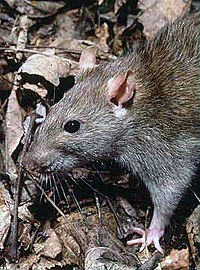
Photo from wikipedia
Abstract Rodents are known to be reservoir hosts of Toxoplasma gondii infection for other animals, such as cats and pigs. From February to July 2017, 167 rats (Rattus norvegicus) were… Click to show full abstract
Abstract Rodents are known to be reservoir hosts of Toxoplasma gondii infection for other animals, such as cats and pigs. From February to July 2017, 167 rats (Rattus norvegicus) were trapped in Grenada, and serum, heart, skeletal muscle, and brain were examined for T. gondii infection by serological examination (modified agglutination test, 1:25) for T. gondii antibodies and for viable parasites by bioassay in mice. Samples of heart, skeletal muscle, and brain of all rats were bioassayed in Swiss Webster (SW) outbred albino mice and interferon gamma gene knockout (KO) mice. Toxoplasma gondii was isolated from heart and brain from 1 rat; this was the only seropositive rat. The T. gondii strain was avirulent for SW mice but killed KO mice. Tissue cysts were detected in the brains of SW mice, and tachyzoites were detected in the lungs of KO mice that died of acute toxoplasmosis. The strain was propagated in cell culture, and DNA derived from cell-cultured tachyzoites was genotyped using the 10 PCR restriction fragment length polymorphisms (SAG1, SAG2, SAG3, BTUB, GRA6, c22-8, c29-2, L358, PK1, and Apico). The strain was a clonal Type III (ToxoDB genotype no. 2) strain. Although the prevalence of T. gondii in humans and animals in Grenada is high, rats seem to have little importance in the transmission of T. gondii on this island.
Journal Title: Journal of Parasitology
Year Published: 2018
Link to full text (if available)
Share on Social Media: Sign Up to like & get
recommendations!